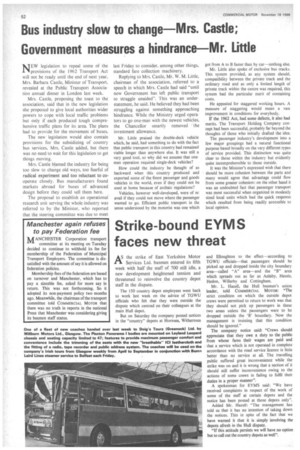Bus industry slow to change Mrs. Castle; Government measures a hindrance—Mr. Little
Page 54

If you've noticed an error in this article please click here to report it so we can fix it.
EW legislation to repeal some of the provisions of the 1962 Transport Act will not be ready until the end of next year, Mrs. Barbara Castle, Minister of Transport, revealed at the Public Transport Association annual dinner in London last week.
Mrs. Castle, proposing the toast to the association, said that in the new legislation she proposed to give local authorities wider powers to cope with local traffic problems but only if each produced tough comprehensive traffic plans for its area. The plans had to provide for the movement of buses.
The new legislation would also contain provisions for the subsidizing of country bus services, Mrs. Castle added, but there was no need to wait for this legislation to get things moving.
Mrs. Castle blamed the industry for being too slow to change old ways, too fearful of radical experiment and too reluctant to cooperate closely. Bus manufacturers found markets abroad for buses of advanced design before they could sell them here.
The proposal to establish an operational research unit serving the whole industry was referred to by the Minister, who reported that the steering committee was due to meet last Friday to consider, among other things, standard fare collection machinery.
Replying CO Mrs. Castle, Mr. W. M. Little, chairman of the association, referred to a speech in which Mrs. Castle had said "until now Government has left public transport to struggle unaided". This was an understatement, he said. He believed they had been struggling against something approaching hindrance. While the Ministry urged operators to go one-man with the newest vehicles, the Chancellor smartly removed the investment allowance.
Mr. Little praised the double-deck vehicle which, he said, had something to do with the fact that public transport in this country had remained viable longer than anywhere else. It was still a very good tool, so why did we assume that oneman operation required single-deck vehicles?
How could the industry be thought of as backward when this country produced and exported some of the finest passenger and goods vehicles in the world, even if they could not be used at home because of archaic regulations?
Vehicles, however well-developed, were of nc avail if they could not move where the passenger wanted to go. Efficient public transport in the sense understood by the motorist was one which got from A to B faster than by car—nothing else.
Mr. Little also spoke of exclusive bus tracks. This system provided, as any system should, compatibility between the private track and the ordinary road and as only a limited length of private track within the centre was required, this system had the particular merit of containing costs.
He appealed for staggered working hours. A measure of staggering would mean a vast improvement in conditions for everybody.
If the 1962 Act, had some defects, it also had merits. The Transport Holding Company concept had been successful, probably far beyond the thoughts of those who initially drafted the idea.
The passenger industry's development into a few major groupings had a natural functional purpose based broadly on the very different types of service provided. This distinction was quite clear to those within the industry but evidently quite incomprehensible to those outside.
It was the Minister's expressed wish that there should be more cohesion between the parts and many would agree that advantage could flow from some greater cohesion: on the other hand it was an undoubted fact that passenger transport was most successful when organized in modestly sized local units which had the quick response which resulted from being readily accessible to local opinion.




































































































































